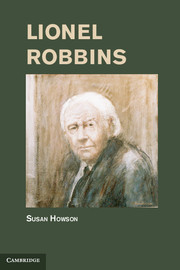Book contents
- Frontmatter
- Contents
- Illustrations
- Abbreviations
- Introduction
- One Father and Son
- Two The Great War
- Three Postwar
- Four The London School of Economics
- Five Iris Gardiner
- Six New College Oxford
- Seven The Young Professor
- Eight Fritz and Lionel
- Nine The School in the Mid-1930s
- Ten The Approach of War
- Eleven The Economics of War
- Twelve Director of the Economic Section
- Thirteen Anglo-American Conversations
- Fourteen The Law Mission and the Steering Committee
- Fifteen 1 9 4 4
- Sixteen The Last Months of the War
- Seventeen The Postwar Settlement
- Eighteen Return to the School
- Nineteen The End of the Transition
- Twenty LSE in the Early 1950s
- Twenty-One Chairman of the National Gallery
- Twenty-two Lord Robbins
- Twenty-three The Robbins Report
- Twenty-four The Sixties
- Twenty-five The Arts
- Twenty-six The Troubles at LSE
- Twenty-seven Retirement
- Conclusion
- Bibliography
- Index
Twenty-five - The Arts
Published online by Cambridge University Press: 07 October 2011
- Frontmatter
- Contents
- Illustrations
- Abbreviations
- Introduction
- One Father and Son
- Two The Great War
- Three Postwar
- Four The London School of Economics
- Five Iris Gardiner
- Six New College Oxford
- Seven The Young Professor
- Eight Fritz and Lionel
- Nine The School in the Mid-1930s
- Ten The Approach of War
- Eleven The Economics of War
- Twelve Director of the Economic Section
- Thirteen Anglo-American Conversations
- Fourteen The Law Mission and the Steering Committee
- Fifteen 1 9 4 4
- Sixteen The Last Months of the War
- Seventeen The Postwar Settlement
- Eighteen Return to the School
- Nineteen The End of the Transition
- Twenty LSE in the Early 1950s
- Twenty-One Chairman of the National Gallery
- Twenty-two Lord Robbins
- Twenty-three The Robbins Report
- Twenty-four The Sixties
- Twenty-five The Arts
- Twenty-six The Troubles at LSE
- Twenty-seven Retirement
- Conclusion
- Bibliography
- Index
Summary
In the 1960s London threw off the drabness imposed by wartime devastation and postwar austerity. ‘Swinging London’ was a city of high as well as popular culture. Lionel Robbins’s contribution to the improvement of cultural life as the chairman of the trustees of the National Gallery in the 1950s has already been described. He contributed too to the revival of the performing arts in London through his service on the board of the Royal Opera House Covent Garden from 1956 to 1980. It is time to consider his contribution to ballet and opera, as well as his second term as a trustee of the National Gallery from 1960 to 1967.
At the Royal Opera House 1956 was ‘a year which had more than its fair share of pleasure and pain’ (Drogheda 1978, 241–7). The Bolshoi Ballet on its first visit to London was a delight and a revelation and a real help to Covent Garden’s finances. There were some ‘excellent performances [of opera] and some frankly less so’, under Rafael Kubelik, music director 1955–8. There was the publication of the first report on the House since it had reopened in 1946, ‘a somewhat inadequate self-laudatory document’ which ‘touched off a whole stream of criticism’ and nearly led to Kubelik’s resignation. The report or the House’s finances were on the agenda for almost every board meeting. Lord Waverley, chairman until his death in January 1958, had not thought a separate finance committee was necessary ‘on the doubtful argument that finance was so important that it was a matter for the whole board.…It was only towards the end of his life that he was persuaded by Lionel to change his mind.’ Robbins’s first recorded contribution was to suggest at his second meeting that the report be launched at a press conference, which took place in June (ROH Board 21 February 1956, Royal Opera House Collections). At his third meeting on 20 March he was ‘invited…to reexamine the estimate for 1956–57’ with Lord Moore (as Drogheda then was), the general administrator David Webster and the chief accountant Douglas Lund, to suggest how it could be reduced by 20 or at least 10 per cent. Lund was also the accounting officer of the Arts Council of Great Britain: of this bizarre arrangement (Lebrecht 2001, 161), ‘Insiders joked that he would write a strong letter to himself demanding financial information [from the ROH], and then carry it from St James’s Square to Floral Street on his lunchtime walk to save postage, before replying to himself in equally robust terms.’
- Type
- Chapter
- Information
- Lionel Robbins , pp. 941 - 974Publisher: Cambridge University PressPrint publication year: 2011

